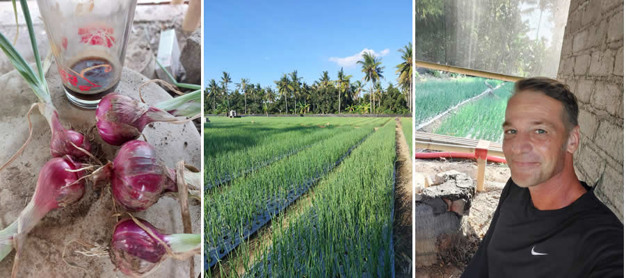The onion market is make or break, not just in the Netherlands but in Indonesia, too, Jurgen Nagel has learned. Although onion prices are much higher - they can reach €2/kg - you are either making a fortune or losing it all. "There's no in-between," he begins. Jurgen left the Netherlands 15 years ago as a social worker. These days, he grows shallots, which are very widely cultivated in Indonesia and is a consultant based in Bali.

Jurgen left the Netherlands in 2008 with lofty ideals of making the world a better place. He volunteered for the SDSP, an organization doing development work in Papua New Guinea. Until 2011, he supervised a mother and child care project in the interior of West Papua. That brought positive change, and infant mortality dropped. But, a tribal war broke out, undoing much that had been achieved. "That got me thinking, and I eventually got into agriculture. I discovered it's a great way to help those most in need."
Sambal economy
Shallots are one of Indonesia's most important crops, so much so that they and chilies determine the country's inflation rate. "Onions and chilies are used in sambal, which Indonesians love. Onions cost, on average, €1.50 to €2 per kilo. That's much more than in the Netherlands," says Jurgen. Cultivation optimization can mean all the difference in Indonesia. "It's very hot and humid in the tropics, so growing onions is challenging.”
"You can spend an entire day attending to a single hectare. Almost everything is still done manually here. Back then, I contacted De Groot en Slot to see if we could use their seeds. They thought Indonesia was interesting,” Jurgen explains. “Together, we set up demo plots and demonstrated that their seeds provide a higher, better quality yield. That makes the onions attractive for export to China or Thailand. So, it can be lucrative."
Nagel now grows shallots and is trying to improve his cultivation method further. "Since everything is still done by hand, we're trying to slowly mechanize things, which is gradually progressing," he says of the state of affairs. He is trying to set up a growers' cooperative so they can enter the market together.
Knows his way around
Indonesia is a world unto itself and a growing economy. Compared to 15 years ago, Jurgen sees major healthcare and infrastructure improvements. It is a vast country with 15,000 islands, and flying from one end to the other takes 4.5 to five hours. Everywhere, the people are equally welcoming and friendly, in Jurgen's experience. "The people are lovely, but when it comes to business, you must stand firm and learn to make the right commercial decisions."
Over the years, Jurgen has experienced and traveled much, so he now acts as an intermediary for companies. "Having lived here for 15 years, I know my way around Indonesia, from small rural villages to the big offices in Jakarta. I know how people think, and I can translate and build bridges. Indonesia is very fluid; you have to be very subtle. As a progressive Dutchman, I can negotiate and get what I want, but it's a very tricky task to master. It is also a matter of ensuring people know you have influential friends and that more people owe you than the other way around," he explains.
Jurgens' social work background helped him hone that sensitivity to Indonesia's web of relationships. Business-wise, he has had to learn a lot. "I've always been way too welfare-minded. You can't help people for a penny when you have to support your own family. However, I do want to do business as sustainably as possible and pay the growers a fair price. You can also make a commercial impact. It helps that companies like De Groot en Slot and Bejo are active here. A good crop offers people the chance to build up a good business and income," concludes Jurgen.
For more information:
Jurgen Nagel
Tel: +62 8533 9288 887 (Indonesia)
LinkedIn Jurgen Nagel
